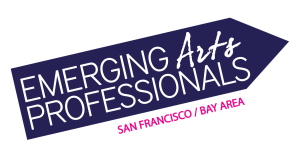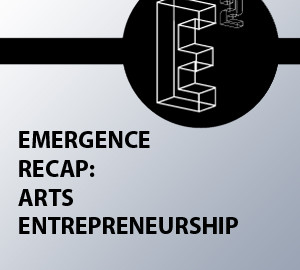Emergence Recap: Independence and the Future of Arts Entrepreneurship
Entrepreneurship, hustle, problem-solving, creativity: call it what you will. Maintaining a career as an independent artist is hard work, demanding just as much time and energy as the art itself, but it is necessary to survive. This was the consensus among the panelists at the discussion on June 4 as part of Emerging Arts Professional’s annual convening, Emergence, which included some other helpful bits of wisdom for cultivating your career as an independent artist.
Three Vs: Vision, values, value ($)
Vision: At the heart of a viable career as an independent artist is a vision. You have to understand what you’re all about as an artist and be confident in that. Don’t let the allure of a gig let you stray from your core vision as an artist. It may happen that your vision expands as your professional endeavors expand, but this is not the same thing. So, how do you articulate this vision?
In the case of Anthem Salgado, one of the panelists, unemployment led him to articulate his vision. After a long stretch of few interviews and no results, he asked himself what sort of arts programs would he advocate if he were working in an organization, and then he took it upon himself to advocate those programs independently. Out of that, two programs emerged. One failed and one succeeded. The latter is Art of Hustle, a website dedicated to doing away with starving artist culture and empowering artists to succeed with an entrepreneurial spirit, and sharing knowledge to that end.
Values: Maintain your personal values. Supporting yourself and developing your career are hard enough as it is. Don’t add to that the dismay of working on a project or with people who violate your principles.
Value ($): Understand your monetary value. As artists, we’re engaged in this pursuit because we care about something, but it can be all too easy to let our caring allow us to do something for far less than we’re worth. Develop an understanding of the current marketplace, really know how much you’re worth, and don’t sell yourself short.
We all need to live and sustain ourselves. Unless you believe that doing a particular gig for free or at a loss would be a good investment in greater future compensation, don’t do it. It may be a hard decision, but it will be worth it in the long run
You are a brand
Out of the three Vs comes you, the artist, as a brand. Amy Kweskin, the discussion’s moderator, explains that with that brand comes a brand promise. You want people to know abour your vision, understand your values, and respect the monetary value of what you do. You want them to know what they can expect from you and be able to dliver on that.
It may be difficult to think of yourself as a business, but if you’re an independent artist you have to think that way. That isn’t to say that your brand as an artist is your identity, but it’s necessary to maintain clarity in the vision of your career.
Be willing to negotiate
Salgado emphasized the idea of consultative selling, wherein whatever artistic project you’re trying to sell to someone must be at least somewhat negotiable. Sit down with that person you’re trying to sell this idea to and listen to their interests and concerns. You can’t simply walk in and lay out a menu of what you can do for them and walk away if they aren’t interested or unable to fund it all. Listen to what they want to do, what they can do, and see if you can’t come to a compromise within your vision and values (of course).
Develop a network
Julie Lazar, director of the International Contemporary Arts Network, discussed the importance of having a strong network of people. Bringing any artistic pursuit to fruition is rarely a personal endeavor. It requires collaboration among people of different strengths.
Many of us artists are not the hustling type, at least not when it comes to the business side of things. If this describes you, then building a network of people around you who are good at the hustle and who believe in what you do can be extremely helpful. Don’t take unfair advantage of them, but don’t be afraid to try to connect with them as well.
Profit vs. nonprofit
While the panelists shared a few helpful tidbits, the general recommendation is that you do your research on the difference between for-profit and nonprofit activities, and consult a tax professional to understand how anything you do fits in with those distinctions.
Various participants in the discussion mentioned some other helpful resources for handling the business end of your independent artistry.
Brien Henderson is a composer in San Francisco. He is developing the San Francisco Composers Guild, a music presenting organization dedicated to the growth and development of young composers through ongoing realtionships with talented ensembles and master composers.





Leave a Reply
Want to join the discussion?Feel free to contribute!